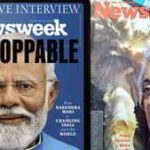 TOPIC – New Delhi
TOPIC – New Delhi
“Government in Delhi will henceforth mean LG’s office, amid a crisis that warns against dangers of centralisation”
In the midst of a public health emergency in which the administration is visibly struggling to provide basic medical care to those who need it, the Union Ministry of Home Affairs (MHA) has effected a transfer of power in Delhi. With the Ministry of Home Affairs notifying the Government of NCT of Delhi (Amendment) Act 2021 on Tuesday night, the office of the Lieutenant Governor has assumed the authority of “government” in the national capital. Chief Minister Arvind Kejriwal and his cabinet will, going forward, need to seek the LG’s approval before executing policies and Delhi has, effectively, been reduced to a Union Territory. The Vajpayee government brought in the statehood Bill in Parliament in 2003. Another BJP-led NDA government now has used its parliamentary majority to crush Delhi’s statehood ambitions and wrest power from its elected representatives, which it will exercise through its unelected nominee. Ironically, this centralisation is being implemented at a time when it is becoming increasingly clear that better governance lies in decentralising administration. The pandemic has highlighted the need for agile responses that are more sensitive to local variables and needs. At a time like this, the Centre needs to push and coordinate, while enabling and supporting states in framing their specific response. So far, the nation’s response to the pandemic has missed this judicious balance — it has reflected neither the level of autonomy nor the amount of synergy needed between Centre and state for a federal polity to meet such a formidable challenge. Though Delhi too has seemed inadequate so far in stepping up to the public health emergency, its government has had some success earlier in designing policies that are more locally attuned — in involving civil society bodies, like RWAs and parent-teacher bodies, for instance, in improving the functioning of public facilities, especially schools. The BJP-led Centre in the Modi regime, on the other hand, has made fetching promises of cooperative federalism, while, all too often, seeking to subdue the federal impulses in the polity. The Centre’s takeover in Delhi takes place close on the heels of the Delhi High Court rightly chiding the state government for its failure to check black-marketing of oxygen in the wake of the pandemic and threatening to ask the central government to take over the state if it cannot handle the situation. Certainly, the Delhi government has stumbled in its Covid response. But does that mean that, henceforth, the Centre will accept full responsibility of the Covid fight in Delhi? And how does this square with the Centre’s vaccination strategy, which has conveniently put the responsibility of procuring vaccines, after letting manufacturers set the factory gate price, on the state governments? And its general attempt to pass the burden of combating the pandemic on the states? Federalism can’t be an idea held hostage to ambition or convenience. It must be a commitment guided by constitutional principles. This is sorely missing in the Centre’s action plan for Delhi.















